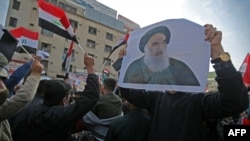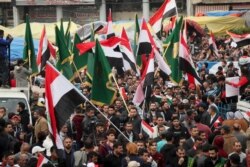Iraq's top Shi'ite religious leader, Grand Ayatollah Ali al-Sistani, called on the country's political leaders Friday not to choose a new prime minister with ties to outside countries, ostensibly referring to Iran and the U.S.
Iraqi Shi'ite worshipers gathered for Friday prayers in the holy city of Karbala as Sheikh Abdel Mehdi Karbalaie, a top spokesman Sistani, urged the country's political class to heed the demands of protesters and choose a new prime minister free from outside ties or any political party.
Iraq's Shi'ite religious leadership "hopes that a new prime minister and a new government will be chosen within the constitutionally-designated period, according to the demands of citizens and with no outside interference," he said.
Karbalaie added that the Shi'ite leadership, known as "marja'aya" in Arabic, is "not taking any sides or playing any role in the political discussions." Additionally, he insisted that no political party or faction try to "use the Shi'ite leadership's banner" to claim legitimacy over any other.
Supporters of pro-Iranian political factions turned out Thursday to demonstrate in Baghdad's Tahrir Square, allegedly using knives to wound more than a dozen protesters belonging to other political groups.
'Support for Iraq's sovereignty'
Khattar Abou Diab, who teaches political science at the University of Paris, told VOA that Sistani has "once again demonstrated his support for Iraq's sovereignty" and decried outside meddling in the country's affairs.
Despite Sistani's Iranian origins and the fact that his own son is reputed to be close to Iranian power-broker General Qassem Suleimani, Sistani is supporting Iraq's nationalist reawakening and a neutral political leadership, Diab said.
Several U.S. think-tanks also have been calling for efforts to divide Iraq's traditional tribal leaders from ties with Iran, but a spokesman for the country's tribal council, Sheikh Mozahem Dawit, told Saudi-owned al Arabiya TV that efforts to do this "are difficult because even traditionally Sunni tribes have developed close ties with the country's Shi'ite militias."
Iraqi President Barhan Salih has approximately one more week to name a new prime minister, ostensibly from the country's largest political bloc. It is not clear who Salih intends to choose. The new prime minister will then have a month in which to appoint ministers to his new cabinet.








